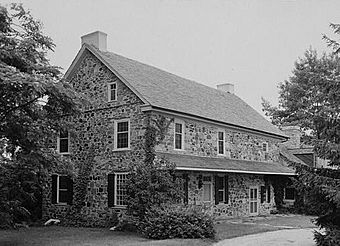Humphry Marshall House facts for kids
|
Humphry Marshall House
|
|

HABS photo, July 1958
|
|
| Location | 1407 Strasburg Road, Marshallton, Pennsylvania |
|---|---|
| Built | 1773–74 |
| Architect | Humphry Marshall |
| Architectural style | Georgian |
| NRHP reference No. | 71000695, 87002596 |
Quick facts for kids Significant dates |
|
| Added to NRHP | May 27, 1971 |
| Designated NHL | December 23, 1987 |
The Humphry Marshall House, also known by cool names like Marshall's Garden or Botany Farm, is a really old and important place in Marshallton, Pennsylvania. It was built a long, long time ago, between 1773 and 1774. This house is special because it was the home of an amazing early American botanist named Humphry Marshall (1722-1801). He was a scientist who studied plants!
This property was also where Humphry Marshall started one of the very first botanical gardens in what is now the United States. It's like a special park just for plants. The house was photographed and studied by the Historic American Buildings Survey (HABS) in 1958. It was added to the National Register of Historic Places in 1971 and became a National Historic Landmark in 1987. Today, the house is privately owned. While the gardens have changed a lot since Marshall's time, you can still see hints of how they were originally laid out.
Contents
The Humphry Marshall House
The Humphry Marshall House sits on about 2.5 acres of land. It's located on the west side of Marshalltown, near Strasburg Road and Clayton Road. The house is set back from the road, hidden a bit by the trees and plants that are part of the old garden.
House Design and Features
The house is 2 and a half stories tall. It's made from strong, local limestone that looks smooth and neat. The front of the house has five sections, but the windows on the first floor are not perfectly spaced. Not all the sections on the second floor even have windows.
There's a simple porch with a slanted roof that goes across the front of the house. You can enter the house through two different doors. One is a regular entrance. The other is a shorter door that probably led to a special room where plants were grown, like a small greenhouse or conservatory.
A Special Cabinet for Plants
Inside the house, there's a really cool feature. A wooden cabinet is built right into the stone walls! It looks like it was made especially to hold and display plant specimens. This shows how much Humphry Marshall loved and studied plants.
Humphry Marshall: The Plant Scientist
Humphry Marshall was born not far from this house. He grew up in a Quaker family and received a good education. He was very interested in plants from a young age.
Starting a Garden
Humphry Marshall first started a garden at his family's home. His cousin, John Bartram, encouraged him to study plants. John Bartram is often called the first British colonial botanist in the Thirteen Colonies. He was a big inspiration for Humphry.
Marshall's Famous Book
Humphry Marshall wrote a book in 1755 called Few Observations Concerning Christ, Or the Eternal Word. But he is most famous for his 1788 book, Arbustrum Americanum. This book was very important because it was the first scientific description of trees and shrubs found in North America. It helped people learn about the plants growing on this continent.
Building His Own Home
Humphry Marshall was also a skilled mason, which means he was good at working with stone. It's possible he even built this house himself! He might have designed it in a way that helped him manage and collect his plant specimens. This house was truly built for a botanist.
 | Emma Amos |
 | Edward Mitchell Bannister |
 | Larry D. Alexander |
 | Ernie Barnes |


